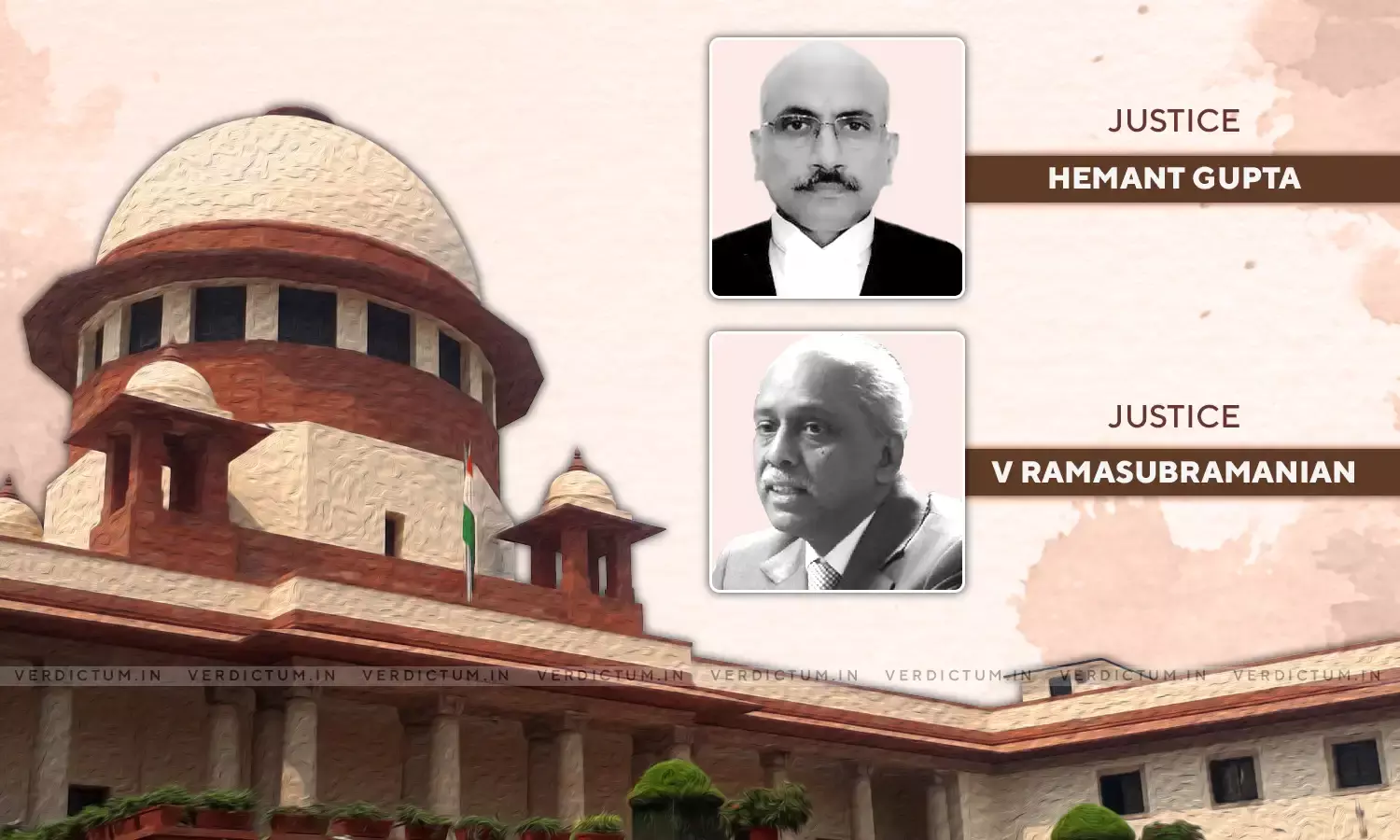Section 23(1) Of Land Acquisition Act - Injurious Affection To Property May Stand On Different Footing From Injurious Affection To Earnings - SC
A two-judge Bench of the Supreme Court comprising Justice Hemant Gupta and Justice V Ramasubramanian has held that clause fourthly of Section 23(1) of Land Acquisition Act uses a significant phrase i.e., "Injuriously affecting his other property, movable or immovable, in any other manner, or his earnings."
Therefore, the Court held, "Injurious affection to property, in any other manner, may stand on a different footing from injurious affection to earnings."
In appeal was the judgment rendered by the Bombay High Court modifying the award of the Reference Court passed under Section 18 of the Land Acquisition Act, 1894.
Mr. Gopal Sankaranarayanan, Senior Advocate appeared on behalf of the Appellant while Mr. Sachin Patil appeared on behalf of the State, and Mr. Deepak Nargolkar, Senior Advocate appeared for the Respondent beneficiary.
The appellant had established a township in a vast area measuring about 16000 acres of land located 136 Kms. Away from Pune. In 1967, the Maharashtra Government had approved BHIMA Ijjani Irrigation Project.
The appellant argued that they wanted the Government to invoke the urgency clause for the acquisition of some other land for diverting the trolley line. The respondents argue that Appellant had abandoned transportation through trolley line and switched to road transport.
A notification under Section 4 of the Land Acquisition Act 1894 was published on 26.10.1972. an award was passed. The claim of the Appellant was not only for market value but also compensation for loss as also for injurious affection due to the trolley line becoming obsolete.
A reference under Section 18 was sought. The reference Court enhanced the compensation for the acquired part of the land to Rs.55,893.23 and fixed an amount of Rs.80,09,725 as compensation on account of severance and injurious affection.
The State filed an appeal. The Appellant also filed an appeal. A common judgment disposing of both appeals was passed. Against this judgment, the appellant preferred the instant appeal. The state did not appeal.
The Court noted that Section 23 and 24 of the LA Act provide two lists of matters respectively, namely (i) matters to be considered in determining compensation; and (ii) matters to be neglected in determining compensation.
The Court noted that points for determination revolve around clauses "thirdly" and "fourthly" of Section 23(1).
The Court noted that the provisions of Section 49(1) have no application in the instant case. The Court made the following observations:
"This is due to the fact that the appellant never desired that the whole of the manufactory shall be acquired by the Government. In fact, the total extent of land owned by the appellant was about 16000 acres, on which a township had come up. Therefore, there was no occasion for the appellant to exercise any option invoking Section 49(1). In any case, the appellant actually requested the Government to acquire land from other people, to divert the trolley line. Therefore, Section 49(1) has no application to the case on hand."
The Court noted that Section 49(2) may not have any application as well for the reason that the Government did not think fir to seek acquisition of the whole of the land on which remaining portion of the trolley existed on the ground that the claim for severance compensation was unreasonable or excessive.
On the claim concerning rail and sleepers, the Court noted that the fundamental flaw in the reasoning of the High Court was that it presumed that it was enough if the land for relocating 7 Kms. of trolley line was acquired.
The Court noted that "Roads can take deviation easily, but not railway lines. Therefore, if land had to be acquired for relocating the trolley line, it should have been for the entire stretch of 35 kms. It is not possible to retain 28 kms. of trolley line and relocate the remaining 7 kms. stretch alone. Therefore, we are of the considered view that the High Court committed a gross error in reversing the finding of the Reference Court under this heading."
On the issue concerning rolling stocks, the Court noted that it did not think that the view taken by the High Court was completely out of sync with the evidence of record and therefore no exception can be taken to the finding recorded by the High Court insofar as rolling stock is concerned.
On the issue concerning increase in transportation cost, the Court noted that "In the absence of any evidence to show that the increase in the transportation cost due to the submerging of a part of the trolley line, had always to be absorbed only by the appellant, but could not have been passed on to its customers due to specific terms and conditions of contract, the Reference Court could not have accepted a claim in this regard."
The Court noted that the decision of the High Court on this head appears to be reasonable and hence, cannot be interfered with.
The Court noted that the upshot of the discussion was that the refusal of the High Court to award any compensation for injurious affect to one set of movable property, i.e., rolling stock cannot be found fault with and similarly refusal to award any compensation for increase in transportation cost falling under the category of injurious affection to earnings cannot also be faulted.
However, insofar as rails and sleepers were concerned, the Court noted that the same was clearly unsustainable especially when the grant of compensation for the injurious affection to rails and sleepers to a stretch of 7 kms submerged in the backwaters, has been sustained by the High Court.
The Court partly allowed the appeals and set aside the judgment of the High Court.
Click here to read/download the Judgment




